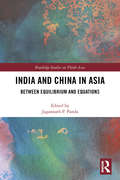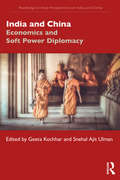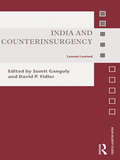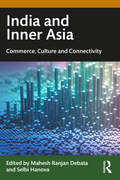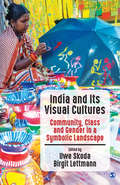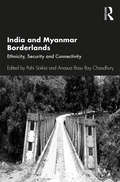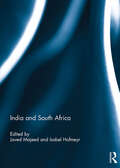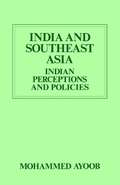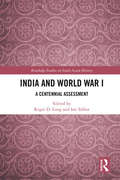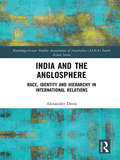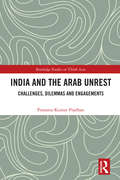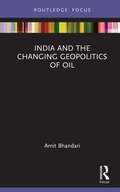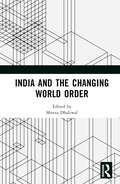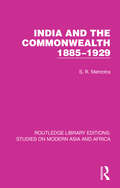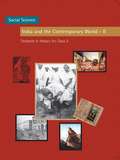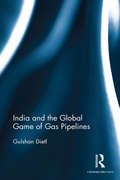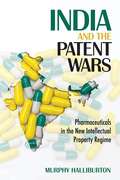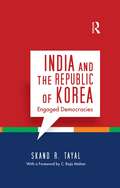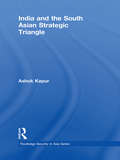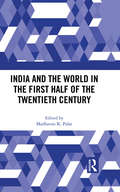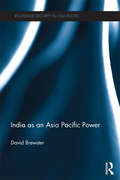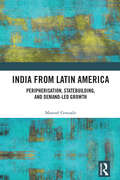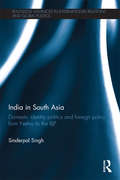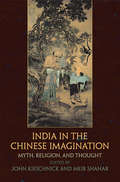- Table View
- List View
India and China in Asia: Between Equilibrium and Equations (Routledge Studies on Think Asia)
by Jagannath P. PandaThis book analyses the structure of the India–China relationship and the two prominent powers’ positions with and against each other, bilaterally and globally, in a complex Asian environment and beyond. India and China’s perceptions of one another are evaluated to reveal how the order of Asia is influenced by engaging in different power equations that affect equilibrium and disequilibrium. Contributors address three critical perspectives of India and China in Asia which are increasingly shaping the future of Asia and impacting the Indo-Pacific power balance. First, they examine the mutual perceptions of India and China as an integral part of Asia’s evolving politics and the impact of this on the emerging Asian order and disorder. Second, they assess how classical and contemporary characteristics of the India–China boundary and beyond-border disputes or conflicts are shaping Asia’s political trajectory and leaving an impact on the Indo-Pacific region. Additionally, contributors observe the prevailing power equations in which India and China are currently engaged to reveal that they are not only geographically limited to the Asian region. Instead, having a strong global or intercontinental character attached to it, the India–China relationship involves extra-territorial powers and extra-territorial regions. This book will be of interest to academics, students and policymakers working on Asian studies, international relations, area studies, emerging powers studies, strategic studies, security studies and conflict studies.
India and China: Economics and Soft Power Diplomacy (Routledge Critical Perspectives on India and China)
by Geeta Kochhar Snehal Ajit UlmanThis book looks at the changing dynamics of diplomacy of the two emerging global powers – India and China. It examines trade relations, cultural ties and economic engagements of both countries and their shifting influence in the region surrounding them. This volume takes an in-depth look at the trade and economic strategies of India and China through the prism of soft power diplomacy. It reflects on the challenges the two countries face over bilateral trade negotiations, BRICS and China’s Silk Road project, along with other issues of foreign policy. The book underlines the decisive role of the soft power approach and greater people-to-people contact in the global strategies of India and China and in fostering greater cooperation in the region. The book will be of great interest to researchers and students of international relations, political science, public policy and international communications. It will also be useful for think tanks, policy makers and general readers who are interested in the India-China relationship and the politics of soft power diplomacy.
India and Counterinsurgency: Lessons Learned (Asian Security Studies)
by Sumit Ganguly David P. FidlerThis edited volume focuses on India's experiences waging counterinsurgency campaigns since its independence in 1947. Filling a clear gap in the literature, the book traces and assess the origins, evolution and current state of India's counterinsurgency strategies and capabilities, focusing on key counterinsurgency campaigns waged by India within and outside its territory. It also analyzes the development of Indian doctrine on counterinsurgency, and locates this within the overall ebb and flow of India's defense and security policies. The central argument is that counterinsurgency has been an integral part of India's overall security policy and can thereby impart much to political and military leaders in other states. Since its emergence from British colonialism, India's defence policies have not merely sought to protect and preserve India's inherited colonial borders from threats by rival states, but have also sought to prevent and suppress secessionist movements. In countering insurgencies, the Indian state has fashioned strategies that seek to repress militarily any secessionist movement, while simultaneously forging a range of civilian administrative and institutional arrangements that attempt to address the grievances of disaffected populations. The book highlights key strategic and tactical innovations that the Indian Army and security forces made to deal with a range of insurgent movements. Simultaneously, it also examines how the civilian-military nexus enabled India's policy makers to utilize existing, and formulate novel, institutional means to address extant political grievances. India has been most successful where it has managed to use calibrated force, obtained the trust of much of the aggrieved population and made persuasive commitments to political and institutional reform. Examination of these elements of India's counterinsurgency performance can be compared to counterinsurgency doctrine developed by other countries, including the United States, and thus yield comparative policy prescriptions and recommendations that can be applied to other counterinsurgency contexts. This book will be of great interest to students of counterinsurgency and irregular warfare, Indian politics, Asian Security Studies and Strategic Studies in general.
India and Inner Asia: Commerce, Culture and Connectivity
by Mahesh Ranjan Debata Selbi HanovaThis book studies India’s historical, socio-cultural, and trade linkages with Inner Asia. Inner Asia includes the landlocked regions within East Asia and North Asia that are part of today's Western China, Mongolia, the Russian Far East, and Siberia. The volume examines issues of geopolitics, geoeconomics, climate change, regional cooperation, and discusses the importance of the fabled Silk Road for the countries of Inner Asia. It also analyses the impact India has wielded upon the region through its cultural traits and how Buddhism has remained a binding force between the people of the two regions. Lucid and topical, this book will be of useful for scholars and researchers of Asian studies, central Asian studies, area studies, geopolitics, international trade, international relations, defence and strategic studies, diplomacy and foreign policy, and political studies. It will also be of interest to policymakers, bureaucrats, diplomats and think tanks.
India and Its Visual Cultures: Community, Class and Gender in a Symbolic Landscape
by Dr Uwe Skoda Dr Birgit LettmannIndia and Its Visual Cultures is a comprehensive mapping and analysis of contemporary cultural artefacts and visual cultures through different approaches—iconographic, social, political, religious and so on. This book covers various media and their histories by studying visual representational systems, production and consumption of media and culture-specific understandings. Crucial questions about the usage of media in research are also addressed in the book. In the selection of the subjects and objects of enquiry, there is a constant engagement with the popular and the everyday. The objects are studied with respect to their situatedness in urban space and everyday life. The five sections of the book focus on five aspects of visual culture: camera works, folk/artistry, market signs, pictorial politics and monumental landscapes. With attention to ethnographic detail and anthropology, each section brings an added dimension to the study of visible cultural forms.
India and Myanmar Borderlands: Ethnicity, Security and Connectivity
by Pahi Saikia Anasua Basu Ray ChaudhuryThis book explores the India–Myanmar relationship in terms of ethnicity, security and connectivity. With the process of democratic transition in Myanmar since 2011 and the ongoing Rohingya crisis, issues related to cross-border insurgency are one of the most important factors that determine bilateral ties between the two neighboring countries. The volume discusses a diverse range of themes – historical dimensions of cooperation; contested territories, resistance and violence in India–Myanmar borderlands; ethnic linkages; political economy of India–Myanmar cooperation; and Act East Policy – to examine the prospects and challenges of the strategic partnership between India and Myanmar, and analyzes further possibilities to move forward. The chapters further look at cross-border informal commercial exchanges, public health, population movements, and problems of connectivity and infrastructure projects. Comprehensive, topical and with its rich empirical data, the volume will be useful to scholars and researchers of political studies, international relations, security studies, foreign policy, contemporary history, and South Asian studies as well as government bodies and think tanks.
India and South Africa
by Javed Majeed and Isabel HofmeyrSouth Africa and India constitute two key nodes in the global south and have inspired new modes of non-Western transnational history. Themes include anti-imperial movements; Gandhian ideas; comparisons of race and caste; Afro-Asian ideals; Indian Ocean public spheres. This volume extends these debates into the cultural and linguistic terrain. The book combines the methods of Indian Ocean studies and Comparative Cultural Studies, both committed to moving beyond the nation state. Case studies explore classics and concomitant ideas of civilisation, colonial linguistics and the history of languages, and theatre. Topics include the use of classics by colonisers and the colonised in British India and South Africa differences between South African Indian English and Indian English how the Linguistic Survey of India conflicted with colonial and nationalist mappings of India and its references to African languages the rise of ‘Hinglish’ in contemporary India a South African play dealing with African-Indian interactions. This bookw as published as a special issue of African Studies.
India and Southeast Asia: Indian Perceptions and Policies (Routledge Revivals)
by Mohammed AyoobThis title, first published in 1990, provides a close contextual analysis of how influential Indian policy-makers have perceived India's interests within the ASEAN region since Indian independence in 1947. Placing these perceptions in the context of India's broad strategic and foreign policy framework, Ayoob analyses the policies which had emerged by the close of the 1980s and stresses the close link between the futures of the two regions. Including a thorough analysis of superpower involvement, as well as Indian relations with Indonesia, Vietnam and Cambodia, this is a comprehensive study of great value to students with an interest in Indian and Southeast Asian history and diplomacy.
India and World War I: A Centennial Assessment (Routledge Studies in South Asian History)
by Ian Talbot Roger D. LongWorld War I directly and indirectly caused events and social and political trends which defined the history of the world for the rest of the century, including the Russian Revolution and the rise of communism to the Great Crash of 1929 which lead to the Great Depression and the rise of Hitler and Nazi Germany. It marked a turning point in world history as the end of the historical era of European dominance and the ushering in of a period which accelerated demands for freedom and autonomy in colonial settings. India played a significant role in the war and in the Allied victory on the battlefield. This book explores India’s involvement in the Great War and the way the war impacted upon the country from a variety of different viewpoints including case studies focusing on key individuals who played vital roles in the war. The long and short term impacts of the war on different locations in India are also explored in the chapters which offer an analysis of the importance of the war on India while commemorating the sacrifices which were made. A new, innovative and multidisciplinary examination of India and World War I, this book presents a select number of case studies showing the intimate relationship of the global war and its social, political and economic impacts on the Indian subcontinent. It will be of interest to academics in the field of War Studies, Colonial and Imperial History and South Asian and Modern Indian History.
India and the Anglosphere: Race, Identity and Hierarchy in International Relations (Routledge/Asian Studies Association of Australia (ASAA) South Asian Series)
by Alexander E. DavisIndia has become known in the US, the UK, Canada and Australia as ‘the world’s largest democracy’, a ‘natural ally’, the ‘democratic counterweight’ to China and a trading partner of ‘massive economic potential’. This new foreign policy orthodoxy assumes that India will join with these four states and act just as any other democracy would. A set of political and think tank elites has emerged which seek to advance the cause of a culturally superior, if ill-defined, ‘Anglosphere’. Building on postcolonial and constructivist approaches to international relations, this book argues that the same Eurocentric assumptions about India pervade the foreign policies of the Anglosphere states, international relations theory and the idea of the Anglosphere. The assertion of a shared cultural superiority has long guided the foreign policies of the US, the UK, Canada and Australia, and this has been central to these states’ relationships with postcolonial India. This book details these difficulties through historical and contemporary case studies, which reveal the impossibility of drawing India into Anglosphere-type relationships. At the centre of India-Anglosphere relations, then, is not a shared resonance over liberal ideals, but a postcolonial clash over race, identity and hierarchy. A valuable contribution to the much-needed scholarly quest to follow a critical lens of inquiry into international relations, this book will be of interest to academics and advanced students in international relations, Indian foreign policy, Asian studies, and those interested in the ‘Anglosphere’ as a concept in international affairs.
India and the Arab Unrest: Challenges, Dilemmas and Engagements (Routledge Studies on Think Asia)
by Prasanta Kumar PradhanThis book is a study of India’s political, diplomatic and security challenges caused by the changing geopolitical and security dynamics in the Middle East and North Africa (MENA) region. Like many other countries, India has been deeply affected by the unrest in the Arab world. As India has several long-term economic, political and security stakes in the region, it has adopted extreme caution in its responses towards the developments in the MENA region since the beginning of the Arab unrest. This book examines India’s policy of non-intervention and opposition to military intervention in the internal and regional affairs of the MENA region. In response to the ongoing conflict, India has engaged with several regional organisations and multilateral forums to work together and find political solutions to the regional conflicts. The book also examines new developments, such as the rise of the Islamic State, and the new security challenges this has introduced. Despite the regional turbulences, the momentum of India’s engagements with the countries of the region has been maintained and India has been building mutually beneficial partnerships in diverse fields. In this context, the book examines the response, approach and the policies India has adopted to protect and promote its interests during the last ten years of unrest. This book will be of interest to researchers, students and policy makers in the fields of international relations, India’s foreign policy, Asian studies, international studies, comparative studies and area studies of the Middle East and South Asia.
India and the Changing Geopolitics of Oil (The Gateway House Guide to India in the 2020s)
by Amit BhandariThe global energy scenario has transformed in the past 20 years. Oil demand, earlier driven by the West, is now shifting to the East, more specifically to Asia. New oil supplies from North America have challenged the hegemony of the traditional oil exporters from West Asia and Africa. India, once a marginal player in the world oil market, is now a valued customer providing demand security for oil exporters. This book systematically examines India’s oil and gas trade, which makes it the world’s third largest importer of oil after China and the US. It explores the changing patterns of oil demand and supply, and the growing market for natural gas, renewable energy, biofuel, and alternative sources of energy. Further, the volume discusses a range of issues that affect India’s position in the global energy econom,y such as The geographic shifts in energy production and trade; international relations and economic sanctions that affect the oil trade; India’s quest for energy security; and contest with China for oil assets; Building new partnerships, and investing in stable, oil-rich countries like the US and Canada, while keeping up existing energy relations with Saudi Arabia, the UAE and Kuwait; Using market mechanisms to ensure energy security. Topical and comprehensive, this book in The Gateway House Guide to India in the 2020s series will be useful for scholars and researchers of international relations, geopolitics, foreign policy, security and strategic studies, energy studies, West Asia studies, South Asian studies, and international trade. It will also be of interest to policymakers, diplomats, career bureaucrats, and professionals working with think tanks, academia and multilateral agencies, media agencies, and businesses.
India and the Changing World Order
by Shveta DhaliwalThis book brings together new perspectives on India’s foreign policy in the light of a constantly shifting world order. From India’s relations in its immediate neighborhood to its China policy, from India-US relations under Biden to Quad, from Grand Strategy to peacekeeping, this book brings to the fore the shifting terrains of global politics and India’s significant place in it. The chapters in the volume: Critically examine changing preoccupations of India’s foreign policy and its geopolitical interests, including its Act East Policy; Include comprehensive inputs on India’s China policy and relations with Japan; Explore India’s relations with the USA, the Middle-East, Afghanistan, and Central Asia; Discuss at length India’s nuclear, energy, and foreign investment policies; Analyze India’s positioning on the emergence of the Indo-Pacific discourse. This volume will be of great interest to scholars and researchers of political science and international relations. It will also be of use to foreign policy and diplomacy practitioners, career bureaucrats and government think tanks.
India and the Commonwealth 1885–1929 (Studies on Modern Asia and Africa)
by S. R. MehrotraThe story of the transformation of the old British Empire into the modern Commonwealth had often been told from the point of view of Great Britain and the ‘white dominions’. No attempt had so far been made to describe the decisive role of India in the shaping of the multi-racial Commonwealth of today. Originally published in 1965, the main theme of this work by an Indian author is the growth of the idea of Commonwealth in India from 1885, the year in which the Indian National Congress was organized, to 1929, when Congress declared ‘complete independence’ to be its goal. What did the British Empire mean to early Indian nationalists? How did the ideal of self-government of India on the Dominion model grow? What was India’s continued association with the Commonwealth valued in India and in Britain? Answers to these and similar questions are attempted in this book. Despite its great importance, the role of India in the Commonwealth in the nineteenth and early twentieth centuries had received little attention from scholars. Dr Mehrotra’s clear, incisive, informed and balanced study was therefore the more welcome, not only for its source, but because it lent a new dimension to our understanding of India’s part in defining and enlarging the idea of Commonwealth. It is an important contribution to Commonwealth and to modern Indian history.
India and the Contemporary World-II class 10 - NCERT - 23 (History)
by National Council of Educational Research and Training"India and the Contemporary World - II" by NCERT is a comprehensive textbook that delves into India's history from the 18th century to the mid-20th century, focusing on key events, socio-political changes, and their global impact. It explores the advent of modernity, colonialism, and nationalism, providing an insightful analysis of India's struggle for independence. The book navigates through significant historical periods, such as the rise of nationalism, the Indian National Movement, and the impact of World War I and II on India. It delves into the social and cultural dynamics, examining factors like caste, class, and gender, and their roles in shaping India's history during this time. Through a balanced and nuanced approach, the book not only presents the historical facts but also encourages critical thinking by highlighting diverse perspectives and their implications in shaping the contemporary world. It offers a comprehensive overview of India's journey from colonial subjugation to the emergence of an independent nation, contextualizing its place in the global socio-political landscape.
India and the Global Game of Gas Pipelines
by Gulshan DietlGas pipelines constitute an important, yet unexplored, aspect of strategic geography. As one of the fastest growing economies in the world, India’s need for energy is paramount. Though surrounded by gas-rich regions – Myanmar and Bangladesh to the east, the Gulf to the west and Central Asia to the north – India does not have a single gas pipeline coming in, going out or traversing through its territory to date. This book highlights the global competition over gas pipelines and its implications for India’s energy security in a comprehensive manner. The author leads us through a labyrinthine world comprising numerous actors – the states, energy firms, scientists, engineers, investors and bankers – engaged in competition over these pipelines leading to a continuous game of checkmating rivals, instigating conflicts, causing damage and destruction and threatening military action to persuade or dissuade states from joining specific projects. Pulsating, rigorous, grounded in hard facts and solid research, this book will be indispensable for scholars and researchers of international relations, strategic affairs, defence studies and politics, as well as think tanks, government agencies and the informed general reader.
India and the Islamic Heartlands
by Sood Gagan D. S."Based on the chance survival of a remarkable cache of documents, India and the Islamic Heartlands recaptures a vanished and forgotten world from the eighteenth century spanning much of today's Middle East and South Asia. Gagan Sood focuses on ordinary people--traders, pilgrims, bankers, clerics, brokers, scribes, among others--who were engaged in activities marked by large distances and long silences. By elucidating their everyday lives in a range of settings, from the family household to the polity at large, Sood pieces together the connective tissue of a world that lay beyond the sovereign purview. Recapturing this obscured and neglected world helps us better understand the region during a pivotal moment in its history, and offers new answers to old questions concerning early modern Eurasia and its transition to colonialism"--
India and the Patent Wars: Pharmaceuticals in the New Intellectual Property Regime (The Culture and Politics of Health Care Work)
by Murphy HalliburtonIndia and the Patent Wars contributes to an international debate over the costs of medicine and restrictions on access under stringent patent laws showing how activists and drug companies in low-income countries seize agency and exert influence over these processes. Murphy Halliburton contributes to analyses of globalization within the fields of anthropology, sociology, law, and public health by drawing on interviews and ethnographic work with pharmaceutical producers in India and the United States.India has been at the center of emerging controversies around patent rights related to pharmaceutical production and local medical knowledge. Halliburton shows that Big Pharma is not all-powerful, and that local activists and practitioners of ayurveda, India’s largest indigenous medical system, have been able to undermine the aspirations of multinational companies and the WTO. Halliburton traces how key drug prices have gone down, not up, in low-income countries under the new patent regime through partnerships between US- and India-based companies, but warns us to be aware of access to essential medicines in low- and middle-income countries going forward.
India and the Republic of Korea: Engaged Democracies
by Skand R. TayalExamining the underlying logic of the strategic and economic partnership between the Republic of Korea and India, this book is the first detailed study of the numerous facets — cultural, economic, people-to-people, and strategic — of blossoming relations between two major Asian democracies. This comprehensive survey documents the interaction between the two governments, relying on facts and hitherto unpublished original records provided by India’s Ministry of External Affairs; offers an illuminating account of India’s active role as a neutral party in the post-Second World War events of the Korean War and the division of the Korean Peninsula; and provides a vision of the future direction of India–Korea relations. The author also shares candid observations of Korean society and its people during his service as Ambassador of India in Seoul. The work will be useful to policy makers as well as students of politics and international relations, strategic studies, economics, and contemporary world history.
India and the South Asian Strategic Triangle (Routledge Security in Asia Series)
by Ashok KapurThis book traces the triangular strategic relationship of India, Pakistan and China over the second half of the twentieth century, and shows how two enmities – Sino-Indian and Indo-Pakistani – and one friendship – Sino-Pakistani – defined the distribution of power and the patterns of relationships in a major centre of gravity of international conflict and international change. The three powers are tied to each other and their actions reflect their view of strategic and cultural problems and geopolitics in a volatile area. The book considers internal debates within the three countries; zones of conflict, including northeast and northwest south Asia, the Himalayas and the Indian Ocean; and the impact of developments in nuclear weapons and missile technology. It examines the destructive consequences of China’s harsh methods in Tibet, of China’s encouragement of military rather than democratic regimes in Pakistan, and of China’s delay in dealing with the border disputes with India. Ashok Kapur shows how the Nehru-Chou rhetoric about "peaceful co-existence" affected the relationship, and how the dynamics of the relationship have changed significantly in recent years as a range of new factors - including India’s increasing closeness to the United States - have moved the relationship into a new phase.
India and the World in the First Half of the Twentieth Century
by Madhavan K. PalatThis book examines how India was placed and placed itself in the world during the first half of the 20th century in a period of global turmoil and set against the subcontinental contest for independence. In situating India in the world, it looks not just at current foreign policy studies, but also at geopolitics, World War experiences, theoretical and strategic approaches, early foreign policy institutional transitions and the role of Indian civil and foreign diplomatic services. The work explores history and theory with a focus on cosmopolitanism beyond nationalism. The use of extensive sources from archives in UK and Russia — especially in different languages, mainly German and Russian — lends this volume an edge over most other works. The book will be useful to professional academics, historians including military historians, security specialists, literary specialists, foreign policy experts, journalists and the general reader interested in international issues.
India as an Asia Pacific Power (Routledge Security in Asia Pacific Series)
by David BrewsterThe emergence of India as a regional and potentially global power is forcing us to rethink our mental map of the Asia Pacific. We are only just beginning to discern how India may alter the global economic landscape. How will the rise of India change the strategic landscape of Asia and beyond? This book provides a comprehensive assessment of India's international relations in the Asia Pacific, a region which has not traditionally been understood to include India. It examines India’s strategic thinking about the Asia Pacific, its relationships with China and the United States, and India's increasingly close security ties with other major countries in the region. It considers the consequences of India’s rise on the Asia Pacific strategic order and asks whether India is likely to join the ranks of the major powers of the Asia Pacific in coming years.
India from Latin America: Peripherization, Statebuilding, and Demand-Led Growth
by Manuel GonzaloThis book studies the economic history of India and traces the Indian path of development from a Latin American framework and perspective. Despite sharing many historical and geological similarities, dialogue between the young democracies of Latin America and the Indian subcontinent is still extremely scarce. The volume builds a common research agenda for the economic development of the Global South. It offers Latin American insights and highlights novelties and commonalities the region shares with India’s economic development. It pays special attention to the (geo)political, technological, financial, and institutional aspects related to the specific geographical and demographical features of the Indian subcontinent. A step towards strengthening the dialogue on economic development in the Global South, this book will be of interest to scholars and researchers of heterodox economics, Indian economy, comparative economics, macroeconomics, political economy, economic history, development studies, Latin American studies, and South Asian studies.
India in South Asia: Domestic Identity Politics and Foreign Policy from Nehru to the BJP (Routledge Advances in International Relations and Global Politics)
by Sinderpal SinghSouth Asia is one of the most volatile regions of the world, and India’s complex democratic political system impinges on its relations with its South Asian neighbours. Focusing on this relationship, this book explores the extent to which domestic politics affect a country’s foreign policy. The book argues that particular continuities and disjunctures in Indian foreign policy are linked to the way in which Indian elites articulated Indian identity in response to the needs of domestic politics. The manner in which these state elites conceive India’s region and regional role depends on their need to stay in tune with domestic identity politics. Such exigencies have important implications for Indian foreign policy in South Asia. Analysing India’s foreign policy through the lens of competing domestic visions at three different historical eras in India’s independent history, the book provides a framework for studying India’s developing nationhood on the basis of these idea(s) of ‘India’. This approach allows for a deeper and a more nuanced interpretation of the motives for India’s foreign policy choices than the traditional realist or neo-liberal framework, and provides a useful contribution to South Asian Studies, Politics and International Studies.
India in the Chinese Imagination: Myth, Religion, and Thought (Encounters with Asia)
by John Kieschnick Meir ShaharIndia and China dominate the Asian continent but are separated by formidable geographic barriers and language differences. For many centuries, most of the information that passed between the two lands came through Silk Route intermediaries in lieu of first-person encounters—leaving considerable room for invention. From their introduction to Indian culture in the first centuries C.E., Chinese thinkers, writers, artists, and architects imitated India within their own borders, giving Indian images and ideas new forms and adapting them to their own culture. Yet India's impact on China has not been greatly researched or well understood.India in the Chinese Imagination takes a new look at the ways the Chinese embedded India in diverse artifacts of Chinese religious, cultural, artistic, and material life in the premodern era. Leading Asian studies scholars explore the place of Indian myths and storytelling in Chinese literature, how Chinese authors integrated Indian history into their conception of the political and religious past, and the philosophical relationships between Indian Buddhism, Chinese Buddhism, and Daoism. This multifaceted volume, illustrated with over a dozen works of art, reveals the depth and subtlety of the encounter between India and China, shedding light on what it means to imagine another culture—and why it matters.Contributors: Stephen R. Bokenkamp, Bernard Faure, John Kieschnick, Victor H. Mair, John R. McRae, Christine Mollier, Meir Shahar, Robert H. Sharf, Nobuyoshi Yamabe, Ye Derong, Shi Zhiru.
